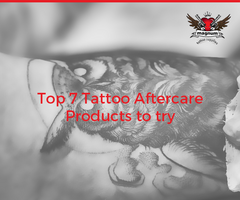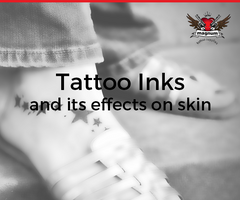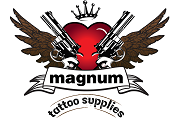Why Tattoo Aftercare Is Important 0

Fore some people, getting a tattoo is all about choosing an artwork, deciding on the size and the placement. Colour, shape, type of ink, are some of the factors one must consider before getting a tattoo. If you're only concerned about these things, then you maybe putting yourself, especially your health at risk.
Getting a tattoo is something you should carefully think about. I'm not only talking about the size, colour, placement, and all the other design factors. Tattoos are scars, only a bit artistic and more colourful than normal ones. This means that tattoos call for an appropriate care and treatment during the first few days or weeks. Not taking care of your fresh tattoo can lead to complications. If you're lucky, neglecting your fresh tattoo will result in damaged or dry skin which will affect the appearance of your tattoo. Worst case scenario, is getting an infection that will cause serious problems.
One important tip that is commonly recommended for people who get's their tattoo for the first time is to use Vitamin A & D ointment as aftercare treatment. A study was conducted to test the effects of these ointments, and it was proven that some ointments only provide limited care. It is true that it can help in the healing process, but it's also true that it does not have the ability to handle potential bacteria build up. These ointments can also cause blockage on pores which can infect the tattoo.
In this article, we will be tackling specific areas regarding tattoo aftercare and its importance. Particularly, the following topics were addressed:
Getting a tattoo means subjecting your skin and body to direct damage. Bacteria can grow quickly when a skin with fresh tattoo is exposed to the wrong environment. It is normal to notice inflammation on your skin after a few days of getting a tattoo. Your new tattoo is technically an open wound. Direct aftercare is needed to defend your skin from bacteria, irritation, and excessive inflammation.
There are a lot of different things that should be considered in the body’s repair process. Ranging from anti-oxidants to essential fatty acids, your skin should be given a complete formula of supportive elements as it recuperates from getting a tattoo. Immediate repair is important to make sure you avoid infections before it even starts.
Once you're sure that you took all the safety precautions to avoid infections during the healing process of your tattoo, the next thing you should work on is the long-term care. To avoid you tattoo from fading easily, try not to expose it to direct sunshine. Avoid scratching it, keep it clean, and moisturised. Make sure you use aftercare products that will not clog your pores.
You should always remember how you've spent a lot of time searching for the perfect tattoo design, and the most skilled tattoo artist to do it. Aside from that, you've worked hard to earn the money you need to pay your artist, why would you want to waste all those efforts just because you're too lazy to search for the best aftercare products your skin needs?
- Matthew Nelson
- Tags: MTS blog tattoo tattoo aftercare tattoo artist tattoo artists tattoo blog tattoo soap UK
Tattoo Aftercare Products You Definitely Need 0

With all the different types of tattoo aftercare products that are available in the market today, choosing the best one to heal your tattoos can be confusing. Together with the number of products available are the different brand names and manufacturers. You should never make a mistake of choosing the wrong product because it might end up irritating your skin.
Here are some of the tattoo aftercare items and products that are essential for your healing tattoo.
Clean Towel. After getting your tattoo, your tattoo artist will suggest a certain amount of time before you remove your bandage. Do not take off your bandage ahead of time. When the right time comes for the removal of the bandage, you should have a clean towel at your disposal. Clean and not just partly clean. It means freshly washed, warmed, and carefully isolated prior to usage. Make sure that it is not just something that you just pulled out from the hamper. After you do the initial washing of your tattoo, carefully pat your skin with the clean towel. It is important for you to do this gently because you are dealing with an open wound.
Tattoo Aftercare Moisturising Lotion. One thing you need to remember is that different lotions have different purposes. You must be cautious of the type of lotion you will be using. Lotions that contain large amount of petroleum and alcohol will actually harm your tattoo and get in the way of your healing progress. One of the best brands for moisturising lotions that is generally recommended by most tattoo artists is Aquaphor. Tattoo Goo and Ink Fixx are also some of the well-known brands that are developed and formulated especially for tattoos.
Remember not to use too much lotion on your skin to avoid irritation. You can clean your skin with water and prevent it from drying out. Scabs should not be peeled off, moisturise it using aftercare products. They have to peel off naturally in order for them to absorb as much colour as possible. Stop application and seek medical advise if your chosen product starts to irritate your skin or gives you a burning sensation. It is perfectly normal for your skin to become swollen and a bit reddish a day or two after you get a tattoo. However, if you feel that the swelling and redness is too much and lasts for more than 3 days, it might be a sign of infection. Consult your doctor or your tattoo artist when this happens.
Tattoo Aftercare Antibacterial Lotion. There are a lot or antibacterial lotions you can buy, but not all antibacterial lotions can be used on fresh tattoos. It might even cause more damage to your skin because of ingredients that are harsh for your tattoo like alcohol. It can even cause your tattoo to fade. Look for lotions that have minimal to zero alcohol content. Provon and Satin are two antibacterial lotions preferred by most tattoo artists. Remember to put just the right amount of antibacterial lotion to avoid getting complications.
- Matthew Nelson
- Tags: tattoo tattoo aftercare tattoo artists tattoo blog tattoo soap UK
Top 7 Tattoo Aftercare Products to Try 0

Maintaining the look of your tattoo may seem easy, but just like any other things... tattoos fade after a certain time. This is why manufactures in the tattoo industry came up with tattoo aftercare products to help heal your tattoo while maintaining it's vibrancy.
Here are some of the best tattoo aftercare products for healing, moisturising and enhancing the look of your tattoos.
1. Tattoo Goo original aftercare salve 3/4 Ounce tin
This aftercare product comes from 100% natural ingredients. It is made with herbs, vitamins, and oils known for their healing properties. Using this product allows the skin to breathe and soothe during your tattoo's healing process. Tattoo Goo original aftercare salve is also useful for the skin that is damaged, chapped, scraped and sun or wind burned.
2. Landerm transparent film tattoo aftercare
Landerm transparent film adhesive tattoo dressing keeps your skin away from water, germs and dust while still letting your skin breathe. It is a hypoallergenic adhesive protective barrier designed to speed up recovery of your new tattoo. It's an adhesive dressing that is also light and flexible that provides ultimate comfort. It can also be cut out to adjust to the tattoo size.
3. Ink Fixx tattoo aftercare ointment
Ink Fixx Tattoo aftercare ointment is one of the highest rated tattoo aftercare product on Amazon. It contains all of the necessary vitamins and minerals needed to allow the tattoo to heal fast and naturally. This ointment should be applied daily for your tattoo to avoid cracking, scabbing, or peeling. It also helps to avoid your tattoo’s colour to fade. It is completely based on natural ingredients, making it gentle on skin.
4. Tattoo Goo’s tattoo Kit
Getting the whole kit gives you a great deal. With an affordable price, this tattoo aftercare kit consists of five different products made by Tattoo Goo. Among these five aftercare products are moisturising lotion, soap, ointment, and a lot more. The kit is proven to be one of the best products that can heal your new tattoo. You can use it as skin moisturiser, tattoo healer, soother and infection preventer.
5. H2Ocean Extreme tattoo care kit
This product is one of the most recommended tattoo aftercare products by tattoo professionals worldwide. The 3- step ointment based system is known for its first aid healing process. Just like any other aftercare product, it keeps and protects the colour of your tattoo for a long time.
6. After Inked Tattoo Moisturiser and aftercare lotion
After Inked product is made to moisten your new and existing tattoo. This all- natural product helps your tattoo look and feel healthier. It is also non-petroleum based, paraben-free, fragrance-free, vegan, cruelty-free and gluten-free. This clinically- tested product is safe on all skin types, and is non- irritant.
7. A&D Ointment Element tattoo aftercare medical supply
Inside the package are 144 individual packs. It is used during the tattooing process as a skin moisturiser but it can also be used as a tattoo aftercare lubricant / moisturiser.
Tattoo Tools: Autoclavable or Disposable? 0
 Being a tattoo artist means being responsible for your client’s safety and satisfaction. One of the things a tattoo artist considers before starting their own tattoo business is whether to use autoclavable tools or disposable ones. Tattoo tubes, tips and grips are essential components in every tattoo artist's toolkit, so it's important to choose carefully and pick supplies that are economical without sacrificing quality.
Being a tattoo artist means being responsible for your client’s safety and satisfaction. One of the things a tattoo artist considers before starting their own tattoo business is whether to use autoclavable tools or disposable ones. Tattoo tubes, tips and grips are essential components in every tattoo artist's toolkit, so it's important to choose carefully and pick supplies that are economical without sacrificing quality. Pros and Cons of Autoclavable and Disposable Tattoo Tubes, Tips and Grips
Once you know all the pros and cons, you will have a better idea on whether to choose disposable or autoclavable tips, tubes and grips.
When purchasing disposable types, everything comes in a package, including the grip, tube, and tip. On the other hand, autoclavable tools are often sold separately. Buying tools separately might sound like a burden, but it can actually be a beneficial. There are actually several benefits in purchasing reusable tattoo grips, tips and tubes separately that may outweigh the convenience of all-in-one disposable units. The difference between an autoclave and disposable type are pointed out below.
- Minimal Equipment Needed
- The Cost Factor
- Customizability
Before you start narrowing down your options, you need to know what your choices are as well as the benefits and drawbacks of each option. I hope the comparison I've shared above helps you determine which one will work best for you.
Tattoo Inks and its effects on skin 0

They say wear your heart on your sleeve, but other people choose to wear it on their skin. For some, tattoos are a way of expressing a part of who they are. Aside from that, tattoo is a great form of art. Having a tattoo may not be everyone’s cup of tea because of the risks that come with it. With so much articles written online, it's pretty confusing which ones to take seriously. One of the commonly discussed factor that scares most people who haven't had a tattoo is the ink and the components used to create it.
Tattoo ink is a liquid that contains one or more colourants and other ingredients in the form of adjuvants, such as binding agents, additives and solvents. It is abundant of different chemicals. This is why every tattoo ink is different and might have different effects on the skin. If you get two tattoos in the exact shade, but get them at different times and from different artists who use different inks the chemical compositions probably won’t match. Tattoo inks include pigments, which can contain a variety of metallic salts, like oxides, selenides, sulfides, organic dyes, or plastics, and the carriers with which they are mixed to help provide an even application of the ink.
Inks are usually either alcohol-based or water-based. It may include ethanol, methanol, and glycerin products as mediums for transferring the pigments in the inks. Below are some of the benefits that these types of tattoo inks contain.
- Non- toxic inks
Non- toxic inks are made from organic pigments. It has been developed recently, after certain chemicals previously used to make traditional tattoo inks were linked to cancer. This type of tattoo ink is different since their pigments are all made from ingredients that come straight from nature.
- Water based tattoo inks
Water- based inks produce flexible, dynamic pigments in reliably bold, beautiful colours.
- Vegan tattoo ink
Another type of tattoo ink that is now popular to the majority is the vegan tattoo ink. These inks don’t use any type animal by-products for colour or carrier solutions. Using a vegan tattoo ink is beneficial because it lasts longer compared to regular inks. The ink does not contain chemicals that are harmful for your skin, and for your tattoo artist's health. Research also shows that tattoos with vegan and non-toxic inks have faster healing time because of it's natural ingredients.
- Glow in the dark and backlight tattoo ink
Both inks have been used for tattooing. Glow in the dark ink absorbs and retains light and glows in darkened conditions by the process called phosphorescence. Blacklight ink does not glow in the dark, but reacts to non-visible UV light, which produces a visible glow by fluorescence.
- Black henna
Black henna is normally applied externally for temporary “Mehandi” tattoos, rather than being injected beneath the skin as a permanent tattoo. It is a temporary tattoo that has an ingredients that can also be found on hair dyes.
Recommended Tattoo Aftercare Tips 0

It is important for anyone to properly take care of their skin after getting a tattoo, to avoid infections and complications. Usually tattoo takes two full weeks to properly heal. The following recommended tips will help you take care and heal your fresh tattoo. By following these simple tips, your tattoo will heal at a quicker pace, look wonderful, and reduce the risks of having infections.
- What to do after getting a tattoo: After you get a tattoo, the tattoo artist will clean and bandage your tattoo. The bandage will be removed after at least 2-3 hours, or once you arrive home from the tattoo shop. The reason for this is to seal up the traumatised skin and to prevent the coming out of lymphatic fluid and blood. When it is already time for you to remove the bandage, gently wash your new tattoo by using an anti-bacterial and non-abrasive soap. Do this for at least two weeks. Using a wash cloth is prohibited unless your tattoo is already fully healed. Wash it using your hands and avoid scrubbing it. It would be better if you cover your tattoo with a loose-fitting, protective clothing, rather than having it redressed with a bandage.
- What to do during healing:
- Bathing: Careful handling of your tattoo should be done in the first 2-3 days while taking a bath. Never soak yourself in a hot tub, take a hot shower, or go to steam and sauna rooms. The hot water will open your pores and take out the impurities in your skin, including the tattoo ink pigment. Just use lukewarm water and minimise your time in the shower.
- Swimming: During the first week of your tattoo, avoid swimming, soaking yourself in a Jacuzzi or bath tub. These are possible sources of bacteria and other foreign substances that might infect your tattoo. The only time you can start swimming is when your tattoo has fully healed. Swimming while still scabbing can cause loss of pigment, which can make your tattoo look unattractive.
- Tanning/Sunlight: Eventually, your tattoos will fade. However, prolonged exposure to UV rays, will make it fade faster. Avoid too much exposure from the sun and tanning beds. In order to make your tattoo look great throughout the years, limit your exposure to direct sunlight or if it really can’t be avoided, apply sunscreen to the tattoo.
- If during the healing process your tattoo becomes irritated, red, itchy or secretes fluid, see your doctor immediately.
- How about anti-bacterial ointments? Since a tattoo is an open wound, it is more prone to bacterial infection. Taking the fundamental preventative measures and practising good hygiene will significantly reduce the chances of having serious infections. For the first 2-3 days, apply a thin layer of antibacterial ointment to the tattoo. This must be done repeatedly throughout the day in order to make sure that the tattooed area of the skin does not dry up and be infected. Bacitracin, which can be found in the first aid section of your local drugstore, is a recommended medicine. Wear loose-fitting clothes in order to allow the tattoo to breathe.






